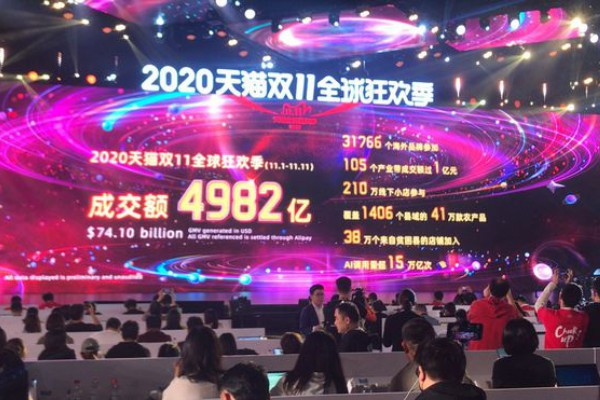China's top market regulator is taking a final swipe at the country's biggest internet companies as the government puts antitrust in its crosshairs.
Three leading e-commerce companies - JD.com, Alibaba's Tmall and Tencent-backed Vipshop - have been fined 500,000 yuan ($76,657) and requested to "conduct rectification" for irregular pricing over the past two months, according to a statement by the State Administration of Market Regulation.
"Consumers have complained these platforms raised prices before introducing discounts, conducted fraudulent promotions and induced consumers into purchases related to Nov. 11 shopping events," the administration said in a statement. "So the authority investigated."
During Nov. 11 shopping events JD.com, Tmall and Vipshop claimed to have earned 271.5 billion yuan, 498.2 billion yuan and 10.2 billion yuan in revenues, respectively, according to public information. Tmall and Vipshop claimed revenues increased by 26% and 27% compared with the same time a year ago.
Regulators found seven pricing irregularities on Vipshop. In one example, a rice cooker was advertised as "the lowest price across the whole internet." The authority said the company "couldn't prove such a claim was true."
Similar cases were seen on the other two applications. The regulator charged JD.com on nine pricing irregularities while Alibaba was found to have 10.
In response, Vipshop said it would "comprehensively address the matter and further standardize its business operations." Alibaba and JD.com didn't respond to requests for comment.
Analysts said that with their advanced technologies the internet companies had made promotional approaches more complicated and harder for consumers to identify.
Fliggy, an online platform owned by Alibaba, was accused of "false promotion" for selling hundreds of tickets for budget travel fares during the Nov. 11 shopping event. It later couldn't issue tickets to consumers and claimed "system problems." Sina's Black Cat Complaints, a consumer complaint and mediation company, has received 305 complaints about this but resolved 0.66% of cases.
The administration released draft antitrust guidelines Nov. 10. It signaled policymakers' growing concerns over monopolistic practices and unfair competition.
As of Dec. 1, the administration followed up a temporary regulation specifically to standardize promotional behavior. The regulation imposed restrictions on raising prices before discounts, conducting complicated discount rules and other deceptive promotional behavior.
The administration has fined Alibaba Investment, a subsidiary of Alibaba Group Holdings Ltd., Tencent Holdings-backed China Literature and Shenzhen Hive Box 500,000 yuan each for failing to report acquisition deals for antitrust review.






